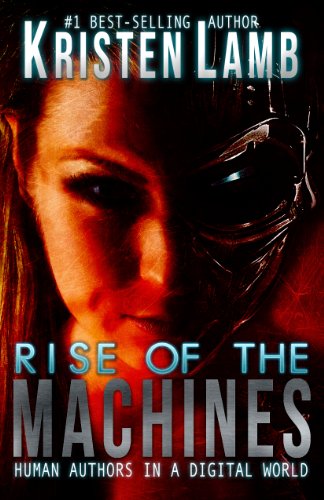On November 1st, 2019, I posted about Why A.I. Will Take Over Fiction Writing.
Four days later, on November 5th, the Elon Musk-backed Talk to Transformer went live for all to use.
Elon Musk-backed non-profit OpenAI, which claimed to have developed a machine learning-powered text generation software so powerful that it couldn’t be ethically released to the public, has… done just that.
OpenAI previously said that the text generator, using the GPT-2 software and trained on some 40 gigabytes of data yanked from eight million websites, was so good at generating text from a given prompt that it could be used to generate convincing hoax stories. The Guardian described it as “capable of writing plausible passages that match what it is given in both style and subject,” as well as significantly better for general usage purposes than preceding models.
Indeed, “convincing hoax stories” would seem to be the biggest issue with programs such as Talk to Transformer. Unless you’re an author, that is. 😈 In that case, a program/app that generates convincing fictional text is not an ethical issue at all, and is in fact your raison d’être. 😉
In a downright stupefying irony, I’m posting all this in November. Which happens to be “National Novel Writing Month”, also known as NaNoWriMo.
To win NaNoWriMo, participants must write an average of approximately 1,667 words per day in November to reach the goal of 50,000 words (for the month) written toward a novel.
Okay, then, how about an impromptu test of Talk to Transformer, using this 27-word paragraph opener from one of my unfinished manuscripts?
“Go get ’em.”
The last words of Jasso, a Junior Cadet who was marching in the Celebration of the Military parade when Sacred Path’s bomb went off.
The result?
“Go get ’em.”
The last words of Jasso, a Junior Cadet who was marching in the Celebration of the Military parade when Sacred Path’s bomb went off.
Jasso, now 18, is still recovering from the incident, but recently came forward and spoke to a reporter in person.
Jasso said she was running with friends near the base gate when she heard an explosion.
“All of a sudden I heard this loud boom and I saw everything around me, and I saw smoke, and I saw a lot of smoke. I tried to take cover but I was too far away.
“Then it started to go black. Then I got really confused, I didn’t know what happened.”
At the time, she was unaware of the threat posed by the bombs. She was in shock.
“When I woke up, I was crying,” she said. “It was one of those feelings like you know.”
A member of the public found the bomber and gave him a letter addressed to the Minister of Defense, explaining that Sacred Path was a Junior Cadet who was killed on November 5, 2012.
“I hope he knows that he didn’t die in vain,” the letter read. “We don’t have any more to lose.”
“I just found him by a pond at about 1:30 p.m. and he was covered in blood and had his clothes off. I gave him the letter,” said the person who found Sacred Path.
“I told him that he was going to get a new life because he did the right thing,” said the member of the public.
“I know his family. They’re a tight-knit family, so they were very nice. I also gave him some bread and milk.”
Just imagine how much better this would be if the A.I. had grasped that “Sacred Path” is an organization, not an individual, as I think most humans would have inferred. That said, a human writer could also find that misinterpretation interesting, and run with it.
More to the point, Talk to Transformer generated this original-text 265 word paragraph completion from a 27-word opener in less than twenty seconds.
I could simply repeat this very brief process several times, and I would then complete NaNoWriMo’s 1,667 words goal for one day, in less than ten minutes. 😄
And remember, this is all original text, so you are not technically “cheating” on NaNoWriMo’s goal of word generation.
The ultimate goal of NaNoWriMo is not to create quality, publisher-ready work. The goal is to write 50,000 words in one month, period. The motivation behind this main goal is to acclimate writers in the “grunt work” of creating and typing the original text. Which will soon no longer be necessary, as I’ve already demonstrated right here in this very post!
The only thing which human-typing out 50,000 words a month will really train you for is to be one of James Patterson’s many ghostwriters. At least until a more refined, fiction-writing-specific version of Talk to Transformer’s A.I. becomes available to Patterson and his like, which will instantly unemploy all those ghost-writers text completers.
As I said in my previous post:
If you think Amazon Kindle Direct Publishing is crowded now, with over a million books a year being added to K.D.P. even at the present time, just wait a decade or two for when no one even has to do the “grunt work” of typing the majority text. Everyone’s “idea” for a novel will suddenly become a novel. Even now, there are at least a hundred people with “ideas for a novel” (for every person who has finished a novel) who have not finished their novels due to the grunt work required to create the text. What happens when all those “ideas” can become novels in a day or two, without all the “heavy lifting” of typing out text? Predictive text A.I. programming fed by human ideas will bring its own version of the “infinite monkey theorem” to life.
Think “discoverability” is a big problem for new works now?
Just wait until there are over 500 million e-books floating around in cyberspace. Maybe even over a billion, who knows? 😈Winning the Powerball jackpot or being struck by lightning will seem like quite reasonable odds by comparison.
“A decade or two?” At the rate we’re going, with a CGI James Dean already “cast” for a lead role in a movie, twenty years from now we might be watching entirely A.I. generated movies, from the story creation to the “acting”, “directing”, editing, etc.
Or maybe we could have A.I. watch them for us, and we could all go fishing… 😉
Update: 2022 Links:
https://www.theverge.com/c/23194235/ai-fiction-writing-amazon-kindle-sudowrite-jasper
https://www.theverge.com/23520625/chatgpt-openai-amazon-kindle-novel





